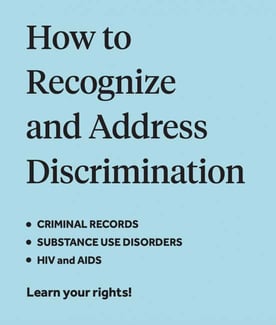
In a Nutshell: Since 1973, the Legal Action Center (LAC) has fought discrimination against and to restore opportunity for individuals with arrest and conviction records, addiction, and HIV/AIDS. Its 50 Years of Impact anniversary campaign seeks to ensure another five decades of impact building a healthier, more equitable, and just nation for all. LAC conducts impact litigation to strengthen the rights and protections for people impacted by the criminal legal system and aims to broaden access to addiction and mental health care. Supporting LAC helps break the cycle of criminalization, economic insecurity, poor health, and recidivism.
A central question of justice is whether a guilty verdict or plea is a sentence of punishment or the arrival of an opportunity to live a better life. Small everyday victories in the court system are evidence of peoples’ hopes, but the system also demonstrates that, for some people, hope can feel like a thing of the past.
The tipping point for many seems to come at the moment of incarceration. That’s especially true for individuals struggling with substance use and mental health problems. For some, the moment of arrest or conviction gives rise to financial and psychological collateral consequences that keep growing and compounding throughout a person’s life, preventing them from ever really moving forward.

The Legal Action Center (LAC) sees that daily through its work to end punitive responses to stigmatized health conditions like substance use disorder and create equitable access to treatment. Since 1973, New York-based LAC has worked to protect the civil and legal rights of individuals regardless of their history of justice involvement or medical condition, and to dismantle systemic racism and inequity that has led to mass incarceration and disparate community health systems.
LAC’s 50 Years of Impact anniversary campaign is, in many ways, a time of looking back on half a century of fighting discrimination, building health equity, and restoring opportunity for people with arrest and conviction records, substance use histories, and HIV or AIDS. As it works to ensure another 50 years of impact, LAC Director of Communications Arianne Keegan said LAC draws inspiration from its legacy while keeping its gaze firmly forward.
“Our priorities and core values have held strong as we’ve adapted to tackle new issues and address the evolving needs of our clients and communities,” Keegan said. “We’re committed to our mission and working diligently to build on our successes and expand our capacity, reach, and resources.”
Promoting Fair Hiring and Expanded Social Access
Persistent trends of inequity fuel LAC’s renewed stalwart commitment to justice. Among the 70 million to 100 million Americans with a conviction record, low-income individuals of color are disproportionately represented and affected by laws that systematically attempt to block people with conviction histories from accessing employment. Known as collateral consequences, these restrictions often punish people long after they complete their sentences.
Meanwhile, stigma against individuals with conviction records, mental illness, substance use disorder, and HIV/AIDS remains pervasive, and millions cannot access the health care they need. Drug overdose rates are higher than ever, yet discriminatory insurance barriers and lack of affordable, accessible treatment options consign many individuals suffering from substance use disorder to criminalization with the system.

Because jobs are key for stigmatized individuals to achieve permanent independent status, LAC employs a multifaceted approach to fulfill its fair hiring and employment mission. They offer free direct legal services to New York residents facing discrimination based on arrest or conviction records. LAC also conducts impact litigation to establish important legal precedents to protect many more people from discrimination. And LAC works with partners, employers, and policymakers at all levels to advance laws and practices promoting fair hiring and expanding employment opportunities.
Through its resource library, LAC provides educational resources and training to people directly impacted by the criminal legal system, as well as other advocates and providers. In its National H.I.R.E. Network Clearinghouse which focuses specifically on helping individuals in reentry, users can find information about state-specific agencies, organizations, practitioners, and other supportive services. The network also conducts advocacy at the federal and state levels and promotes collaboration between stakeholders and individuals in the criminal legal system.
LAC extends the battle against discrimination to housing, education, health care, and within the family regulation systems, in addition to its fight for fair hiring and employment. “We work to guard rights and liberties across the board, so that individuals can support themselves, their families, and participate meaningfully in our shared communities,” she said.
In-Demand Resources Offer Practical Guidance
LAC understands the importance of circulating free resources so people know their rights and are equipped with as many tools as possible to protect them from discrimination. Its Legal FAQs provide a deep dive into the rights of individuals with conviction records.
“We provide answers about the legality of employers asking about criminal records,” Keegan said. “And we outline the steps individuals can take to increase their likelihood of obtaining gainful employment.”
In addition to fair hiring and employment, other criminal legal topics include expungement and sealing, and voting rights. Their FAQs also explore the associated intersecting challenges of stigmatized health conditions like HIV/AIDS and substance use disorder, including the right to medication for addiction, health privacy, and equitable insurance coverage.

Another helpful resource is the How to Recognize and Address Discrimination guide, which includes information on laws that make it illegal to discriminate against individuals with substance use disorders, arrest or conviction records, or HIV/AIDS. The guide also addresses the limits on what employers, landlords, and others may ask about health status or involvement with the criminal legal system, how to secure a job or housing, and what to do about illegal discrimination.
Their Virtual RAP Sheet Workshop is particularly popular. It’s a video-based module series that educates people on RAP sheets and why anyone arrested should obtain a copy of their record. Another popular resource, How to Gather Evidence of Rehabilitation, is a guide to help individuals with arrest or conviction records convince employers, landlords, government agencies, or other decision-makers to give them a fair chance. And LAC is always updating and releasing more materials, so no doubt, there will be more to come.
“We’re continually evolving to make sure we’re being responsive to the needs of our clients and what we’re seeing reflected in impacted communities,” Keegan said. “Their lived experience informs the full spectrum of our priorities, which means we’re always adapting and pivoting to produce the most helpful and in-demand resources.”
A 50-Year Legacy of Breaking Barriers
In New York, the Certificate of Relief from Civil Disabilities and the Certificate of Good Conduct can help reduce a person’s collateral consequences from conviction and open opportunities for them to apply for jobs, professional licenses, and public housing.
Keegan said LAC’s Legal FAQs focus primarily on New York laws but include some out-of-state information and a full rundown of discriminatory practices employees and job-seekers with arrest or conviction records, substance use disorders, or HIV/AIDS may encounter in their jurisdictions.
The COVID-19 pandemic brought the inequities and injustices LAC has been fighting for 50 years into sharp focus, and it no doubt exacerbated the struggles of the people LAC works to help. It has worked diligently to scale its efforts and expand capacity.
LAC welcomes contributions of all sizes as part of its 50 Years of Impact campaign. It continues to focus on eliminating record-related barriers and expanding housing, employment, education, public benefits, and voting opportunities for individuals with conviction histories. Another long-standing and complementary advocacy priority is shifting toward a health-first approach to substance use and away from punitive responses that have caused so many with substance use disorders to end up with conviction records.
“We work to increase support for community-based health care and alternatives to incarceration, and we push for the expansion of reentry supports to ensure individuals can succeed when released from jail or prison,” Keegan said.
LAC also fights to improve insurance coverage for evidence-based substance use disorder services, medications, and supports through enforcement of the Mental Health Parity and Addiction Equity Act, which they helped push to become law in 2008. And all its work is done through a racial justice lens that accounts for the disproportionate harm wrought on Black and brown individuals resulting from the systemic racism ingrained in both the US health care and criminal legal systems. Their “No Health = No Justice” campaign epitomizes this as a natural outgrowth of the work they have been doing all along.
New areas of policy concern tend to evolve organically given the interconnectedness of LAC’s work, Keegan said.
“Our work with clients informs our advocacy priorities, and our state advocacy complements our federal work — all of which allows us to maximize our effectiveness and impact,” she said.






